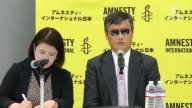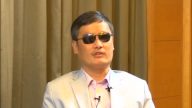【新唐人2012年12月03日讯】11月30号,山东沂南当局在一次突然举行的庭审中,判处盲人维权人士陈光诚的侄子陈克贵有期徒刑3年3个月。这引发各界强烈不满。陈克贵的父亲陈光福指责判决不公,认为当地官员深夜闯入民宅,陈克贵被迫用菜刀反抗,属于正当防卫。美国国务院也批评说,陈克贵案的审理过程充满漏洞,中共当局应该重新审理。
陈克贵的父亲陈光福向《新唐人》透露,开庭的前一天晚上,他曾经询问陈克贵的官方指定律师,是否有开庭消息,对方回答没有。但30号上午10点半以后,律师突然打来电话说,案件将在下午两点钟开始审判。
陈光诚兄 陈光福:“一点半左右,我们赶到了县法院门口,要求旁听。但是被众多的便衣、公安阻止,他们不让我去参加旁听。(我们)连法院的大门也没有进去。”
陈光福指责,目前的判决结果非常不公平。
陈光福:“他(陈克贵)五更半夜的正在睡觉,面对翻墙入室、打砸抢者,他完全是一种正当防卫。但是却以‘故意伤害’被判处3年3个月的徒刑。这我们很难接受。”
今年(2012年)4月,山东著名盲人维权人士陈光诚成功从家中出逃,脱离软禁,这让当局非常恼怒。当地镇长张健深更半夜带领打手持棍棒、翻墙闯入陈光诚的侄子陈克贵家,并殴打他,陈克贵被迫防卫,用菜刀将张健砍伤。随后,沂南县当局以“故意杀人罪”逮捕起诉陈克贵,后来在外界的关注与抗议下,把罪名改为“故意伤害”。
目前身在美国的陈光诚对《美国之音》表示,突击审判陈克贵并不是沂南县自行决定,而是级别很高的上层旨意。这一判决结果,也让他对中共新领导层所谓的“新政”失望。陈光诚揭示,2005年他遭受迫害坐牢时,是现任中共政治局常委张高丽担任山东省委书记。现在的判决说明,张高丽在包庇山东官员的“犯罪活动”,所以一当上常委就开始继续对他和家人迫害。
美国国务院发言人努岚,也批评中共不遵守国际承诺和人权宣言。她指出,陈克贵被判刑的过程充满漏洞、缺乏基本的正当程序,陈克贵不但无法决定自己的辩护律师,连官方指定律师都拒绝向陈克贵家人提供案件的相关信息。美国国务院敦促中共当局重新审理此案。
北京律师 刘晓原:“这个案子,程序上我们始终认为有问题。案件一开始,家属聘请律师它不让。并且这个案件是当庭宣判的,这种情况也很少,在司法实践中,一个刑事案件当庭宣判,这种案例非常非常少。”
北京律师刘晓原认为,当局之所以罕见的当庭宣判,很可能是担心外界的关注与压力。基于同样的担忧,当局也没有遵守开庭前三天通知被告人家属的规定,直到开庭前不足4小时,才匆忙告知陈克贵家人。
对于媒体报导陈克贵当庭表示不上诉,刘晓原分析,这很可能不是陈克贵的自由选择。
刘晓原:“很有可能被告人是受到了压力。再一个,(官方)指定律师也没有给他分析这个案件的实际情况。往往有些律师会说:你这个问题很严重,你不要上诉,上诉会更麻烦。会给他施加压力。”
刘晓原还表示,虽然中共“十八大”之后,重庆方面有一些当年薄熙来制造的冤案出现翻案迹象。但这只是个案,全国更多的冤案并没有得到处理,看不到中国大陆法制上有任何进步。
采访/刘惠 编辑/李谦 后制/钟元
Chen Guangcheng’s Nephew Sentenced to 3 Years and 3 Months in Jail
On Nov. 30, authorities in Linyi, Shandong Province
unexpectedly held a court trial, convicting Chen Kegui.
Chen Kegui is the nephew of the renowned
blind rights activist Chen Guangcheng.
This verdict has aroused strong
public discontentment and protests.
Chen Kegui’s father accused the judgment of being unfair,
as Chen acted in self-defense, after facing violent intrusion.
The U.S. Department of State has criticized that the trial
and verdict of Chen Kegui, for lacking basic due process.
The Chinese Communist Party(CCP)
authorities were called on to review the case.
Chen Kegui’s father, Chen Guangfu, revealed
that the night before the trial,
he asked the court-appointed lawyer about the court date.
The lawyer expressed that there was no any news.
However, after 10:30 am on Nov. 30, the lawyer suddenly
informed him that the case would go to trial at 2pm that day.
Chen Guangfu: “We arrived outside the County Court
around 1:30 pm, and requested to attend the trial.
But numerous plainclothes and uniformed
policemen prevented us from entering.
We were just blocked outside the gate.”
Chen Guangfu criticized that the verdict was very unfair.
Chen Guangfu: “Chen Kegui was sleeping when they
broke into his house at midnight and smashed everything.
He just acted in self-defense, but was handed a jail
sentence of 3 years and 3 months. We can’t accept it.”
In April this year, blind rights activist Chen Guangcheng
successfully fled his own house arrest in Shandong.
This heavily irritated the local CCP authorities.
At midnight, local town mayor Zhang Jian, leading thugs
armed with sticks, broke into the house of Chen Kegui.
The intruders even beat Chen Kegui, who was forced
to defend himself by slashing and injuring Zhang Jian.
Subsequently, local CCP authorities arrested
Chen Kegui and sued him for “intentional homicide.”
Under strong public pressure, the charge
was later changed to be “intentional injury."
Voice of America reported Chen Guangcheng’s
views on the issue, who now lives in the U.S.
Chen Guangcheng believes that the hasty trial
was an instruction from high-level CCP leadership.
The court decision made him disappointed with the
“new governance” of the new CCP leadership team.
In 2005 when Chen Guangcheng was imprisoned
in Shandong, the provincial Party chief was Zhang Gaoli.
Zhang was a newly elected member of the CCP Politburo
Standing Committee at the recent 18th Party Congress.
The verdict indicates Zhang Gaoli is shielding
crimes of CCP officials in Shandong.
That is why persecution has started again on Chen
and his relatives, after Zhang’s new promotion.
U.S. State Department spokesman Victoria Nuland
criticized the CCP’s “failure to honor its international commitments” to respect human rights.
Nuland said that the trial and sentencing
of Chen Kegui was “a deeply flawed legal process”.
Chen Kegui was denied access to his choice of lawyers.
His parents were given little advance notice of the trial.
Nuland called on the CCP authorities to review the case.
Beijing Lawyer Liu Xiaoyuan: “The case is questionable.
It denied Chen’s family the right to hire a lawyer.
Chen Kegui was found guilty in court immediately
following the trial, which is very rare for judicial practice.”
Liu Xiaoyuan analyzes that the unusually quick
conviction may aim to escape public pressure.
In law, families of the accused shall be
notified three days in advance of the trial.
Yet, the court did not inform them until less
than four hours ahead of the court trial.
China’s media reported that Chen Kegui said
he would not appeal against the conviction.
Liu Xiaoyuan speculates that this may not
be out of Chen Kegui’s own volition.
Liu Xiaoyuan: “The convicted are very likely to be pressured.
Also, the court-appointed lawyer didn’t analyze the case.
Some lawyers would often say,
‘This is a very serious problem
You’ll have more trouble if you
appeal against the sentences.’
They might use this method to pressure him.”
Liu Xiaoyuan commented that after the 18th Party Congress,
there are a few injustices, such as those of Bo Xilai
in Chongqing, that seem to show signs of being redressed.
These are just isolated cases, he says, as there are many
more injustices across China that haven’t been vindicated.
So far, there is no any real improvement
of justice that has been seen in China.
























